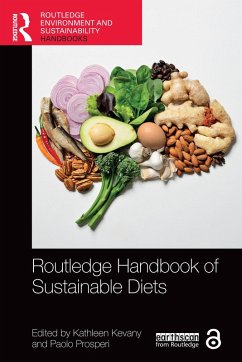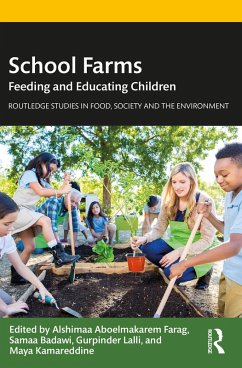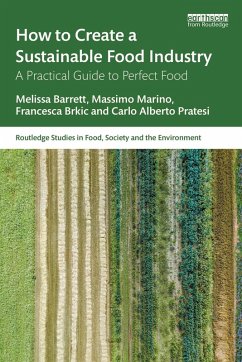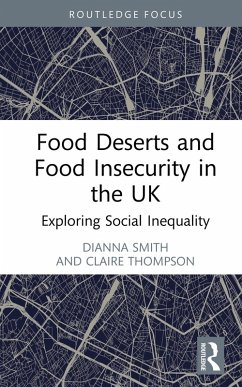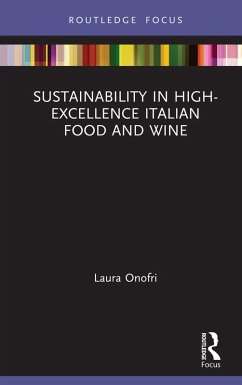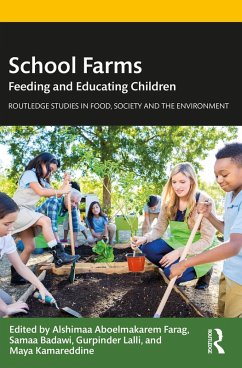
Routledge Handbook of Sustainable Diets (eBook, ePUB)
Versandkostenfrei!
Sofort per Download lieferbar
43,95 €
inkl. MwSt.
Weitere Ausgaben:

PAYBACK Punkte
22 °P sammeln!
This handbook presents a must-read, comprehensive and state of the art overview of sustainable diets, an issue critical to the environment and the health and well-being of society.Sustainable diets seek to minimise and mitigate the significant negative impact food production has on the environment. Simultaneously they aim to address worrying health trends in food consumption through the promotion of healthy diets that reduce premature disability, disease and death. Within the Routledge Handbook of Sustainable Diets, creative, compassionate, critical, and collaborative solutions are called for ...
This handbook presents a must-read, comprehensive and state of the art overview of sustainable diets, an issue critical to the environment and the health and well-being of society.
Sustainable diets seek to minimise and mitigate the significant negative impact food production has on the environment. Simultaneously they aim to address worrying health trends in food consumption through the promotion of healthy diets that reduce premature disability, disease and death. Within the Routledge Handbook of Sustainable Diets, creative, compassionate, critical, and collaborative solutions are called for across nations, across disciplines and sectors. In order to address these wide-ranging issues the volume is split into sections dealing with environmental strategies, health and well-being, education and public engagement, social policies and food environments, transformations and food movements, economics and trade, design and measurement mechanisms and food sovereignty. Comprising of contributions from up and coming and established academics, the handbook provides a global, multi-disciplinary assessment of sustainable diets, drawing on case studies from regions across the world. The handbook concludes with a call to action, which provides readers with a comprehensive map of strategies that could dramatically increase sustainability and help to reverse global warming, diet related non-communicable diseases, and oppression and racism.
This decisive collection is essential reading for students, researchers, practitioners, and policymakers concerned with promoting sustainable diets and thus establishing a sustainable food system to ensure access to healthy and nutritious food for all.
Sustainable diets seek to minimise and mitigate the significant negative impact food production has on the environment. Simultaneously they aim to address worrying health trends in food consumption through the promotion of healthy diets that reduce premature disability, disease and death. Within the Routledge Handbook of Sustainable Diets, creative, compassionate, critical, and collaborative solutions are called for across nations, across disciplines and sectors. In order to address these wide-ranging issues the volume is split into sections dealing with environmental strategies, health and well-being, education and public engagement, social policies and food environments, transformations and food movements, economics and trade, design and measurement mechanisms and food sovereignty. Comprising of contributions from up and coming and established academics, the handbook provides a global, multi-disciplinary assessment of sustainable diets, drawing on case studies from regions across the world. The handbook concludes with a call to action, which provides readers with a comprehensive map of strategies that could dramatically increase sustainability and help to reverse global warming, diet related non-communicable diseases, and oppression and racism.
This decisive collection is essential reading for students, researchers, practitioners, and policymakers concerned with promoting sustainable diets and thus establishing a sustainable food system to ensure access to healthy and nutritious food for all.
Dieser Download kann aus rechtlichen Gründen nur mit Rechnungsadresse in A, B, BG, CY, CZ, D, DK, EW, E, FIN, F, GR, HR, H, IRL, I, LT, L, LR, M, NL, PL, P, R, S, SLO, SK ausgeliefert werden.




